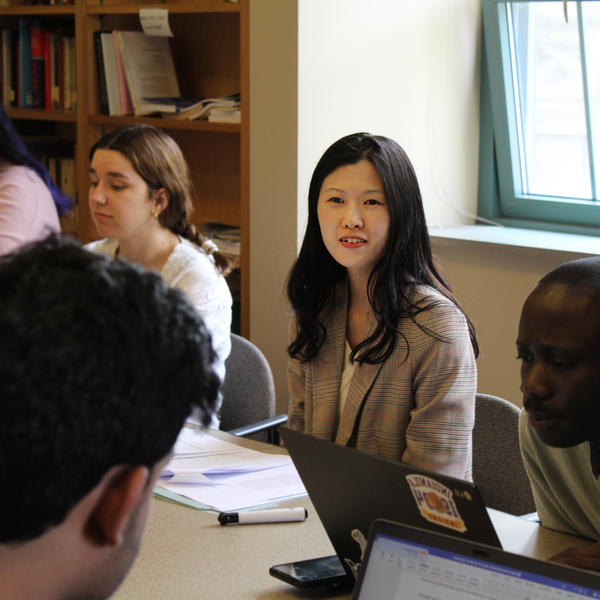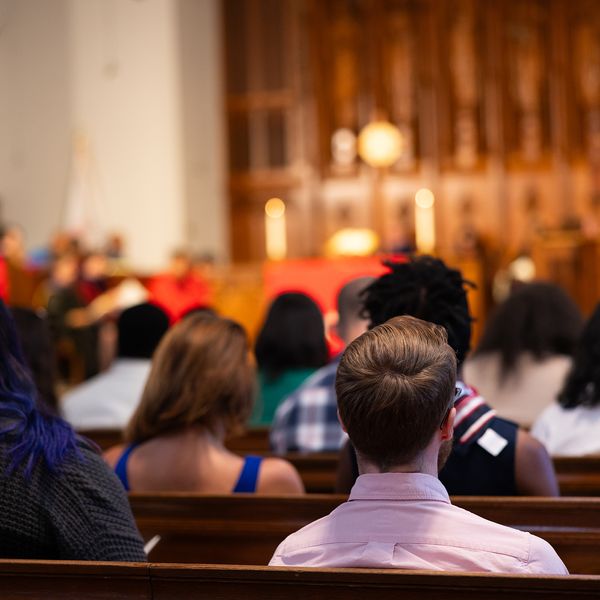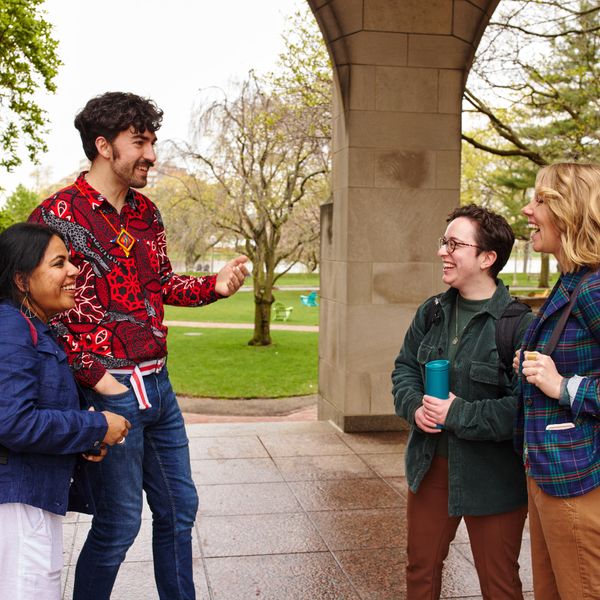Know Before You Apply
At what point are you ready to submit an application to the Boston University School of Theology?
Do you have to know exactly what you want to do vocationally, or have read the bible cover to cover, or be deeply involved in a local church? No! (Though those are all great things.) The BU School of Theology is full of seekers and sojourners traveling down a wide variety of educational and vocational paths. You don’t need to know where your journey of theological education will end before you start, you just have to have the courage and desire to take the first step!
Our students arrive at all different stages in their discernment – some very certain of their goals and others still searching, some clear that ordained ministry is their calling and others still trying to find a faith tradition to call home. Every person’s path to theological education is unique, so trust that yours is perfectly fine.
Before applying to seminary, make sure you have effectively discerned that theological education is the next step for you. Here are some helpful guidelines and some frequently asked questions from our prospective students.
What you should know before applying to seminary:
- Which Degree Program Fits Your Interests
All prospective students should apply to the program that best fits their current interests and vocational plans. Even if you think these things may shift during your seminary study, or your interests are quite vague at the moment, apply to the program you believe is best. If you later discern that you should be in a different program (for example, if your vocational plans change), you can speak with our Registrar to complete the paperwork to do so. STH allows this flexibility to honor the fact that seminary coursework is meant to shape and grow students’ personal and professional goals. The staff and faculty of STH are here to accompany you on these journeys of growth and discovery and will be there to help you discern your next steps all along the way. - 哈
- Whether STH is a Good Fit for You, and Vice Versa
How do you know if a seminary is a good fit for you? First, if you have the time and resources, the best way to get to know STH is to visit campus during the school year. A visit to campus allows you to sit in on classes, meet students and faculty, and get a sense of the city of Boston. If you are not able to come to campus, reach out to the Admissions Office (sthadmis@bu.edu) to speak to a member of the staff about your interests. They can connect you with current students and/or alums whose interests mirror your own. Finally, examine the “about” section of our website, and see if you resonate with our history, mission, and published statements. These help guide the nature of STH’s faculty hiring and the directions of co-curricular programming.
Students who do well at STH are those who arrive with a sense of optimism about doing good work in the world, who are ready for rigorous academic study, and who take social justice concerns seriously, all while practicing humility and good-humor.
Frequently Asked Questions from Prospective Students
Can I be of a different faith and still come to the Boston University School of Theology? Is it a Christian seminary?
The School of Theology is rooted in the United Methodist tradition, and is welcoming of people from all faith traditions. There is a wide variety of theological opinion and expression represented in our student body. Though the vast majority of students identify as Christian, there are students who are of different faiths, as well—particularly Unitarian Universalists who do not identify as Christian, but also Muslim, Buddhist, and Jewish students. We also welcome those who do not ascribe to a religious tradition.
While we welcome students from all faith backgrounds, it is important that non-Christian prospective students realize that many classes they will take at STH present the Christian church and its theologians throughout history. Core courses in biblical studies, church history, and philosophy/theology will focus on the Judeo-Christian tradition as well. While students are often able to negotiate what course papers and personal project topics will cover, all students will have to dialogue meaningfully with the Christian tradition while at STH.
The School of Theology is actively working to increase student access to religious and spiritual wisdom from beyond the Christina tradition as well, often in collaboration with it’s partners in the Boston Theological Interreligious Consortium.
Do I have to interview in-person before being accepted to the School of Theology?
It is not necessary to interview in person before being accepted into a degree program. However, many prospective students find that a trip to STH provides invaluable information while making the decision of whether or not to pursue graduate theological study here. Sometimes it is helpful to familiarize oneself to the School, its community of scholars, and its surroundings in-person. For this reason, applicants to the School of Theology are always welcome to visit. Please see the “Visiting the School of Theology” page of this site for more details on scheduling a visit to campus.
Is the School of Theology a theologically liberal or conservative seminary?
STH is a social-justice-seeking Mainline Protestant seminary, and, as such, has been unapologetic in its mission to “seek peace with justice in a diverse and interconnected world.” This aspiration comes with an institutional commitment to social gospel ideals such as the dignity of individual and communal differences in the human family (see our full diversity statement here), environmental sustainability, and resisting violence in its many forms. However, STH does not require its students, faculty, or staff to believe any certain theology to study or work here. A variety of opinions exists within our classrooms and faculty meetings, which can be challenging in that it raises the same uncomfortable conversations that exist in wider society. Our community principles help us navigate difficult interactions with personal integrity and respect for others for the purpose of expanding our understandings of one another and the world in which we live.
What if I don’t meet the standards for admission to a program at STH?
Each of the degree programs offered by STH has its own admissions standards, which include a minimum cumulative GPA, strong composition and grammar skills, and good letters of reference, among other credentials. (See the application section of this website for a full list of requirements and deadlines.) But what if you do not meet the minimum standards for admission? The most common examples are applicants with a GPA under 3.0, those who have not completed a previous Bachelor’s degree, or (for some international students) a TOEFL score below 89. If this is the case for you, there are some things you can do:
- First, be in touch with the Admissions Office (sthadmis@bu.edu) to speak about your particular situation. If there are extenuating circumstances for lower scores, such as a documented learning difference, let them know. This can be part of the broader consideration of your application.
- If you know that your application is not strong in one area, make sure that it is very strong in all others. The essay and personal statement portions of the application are highly valued by the Admissions Committee, which learns from these about both an applicant’s writing prowess and fit with STH. Strong references are also helpful.
- Finally, masters applicants who are not admitted into a full degree program can apply to be Special Students instead, taking classes as a non-degree student for one semester (please note: non-degree students do not receive scholarships or federal aid). If a Special Student successfully completes several STH courses, this coursework can be grounds for reconsideration of the person’s application. In other words, time as a Special Student can prove one’s ability to do graduate-level theological work, even if they were not admitted at first to a degree program. Several students each year begin as Special Students and matriculate into a full degree program in a subsequent semester.
Even with the above tips, sometimes an applicant’s stated goals and/or vocational vision are not well-aligned with the offerings and programs of the School of Theology. In these cases, applicants may not be not admitted. Should this be the case, our Admissions Office may be able to direct you to schools that would be a better fit for your interests and would be happy to help in this way.



